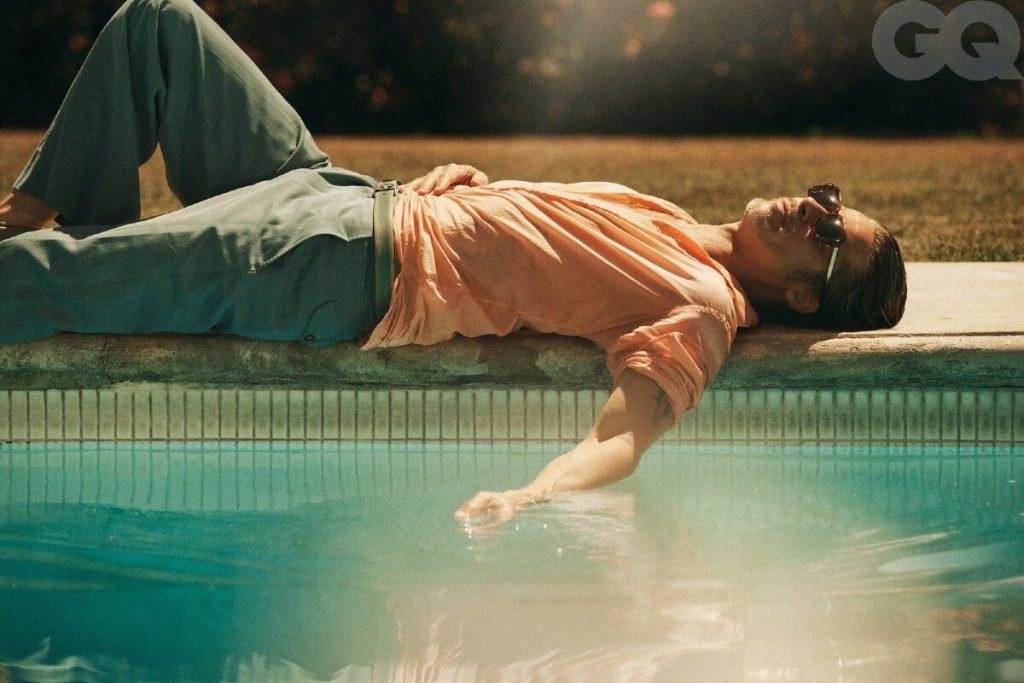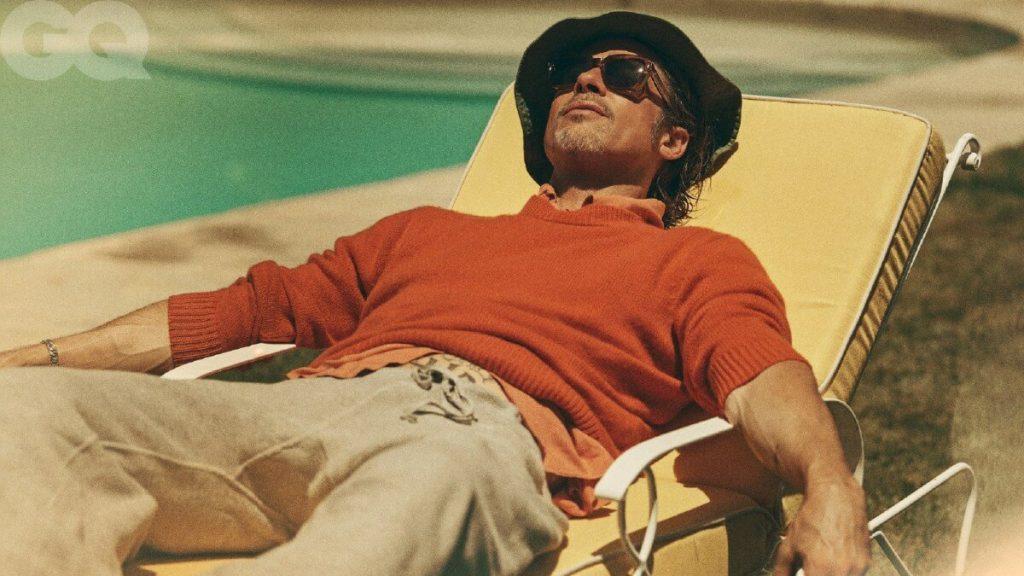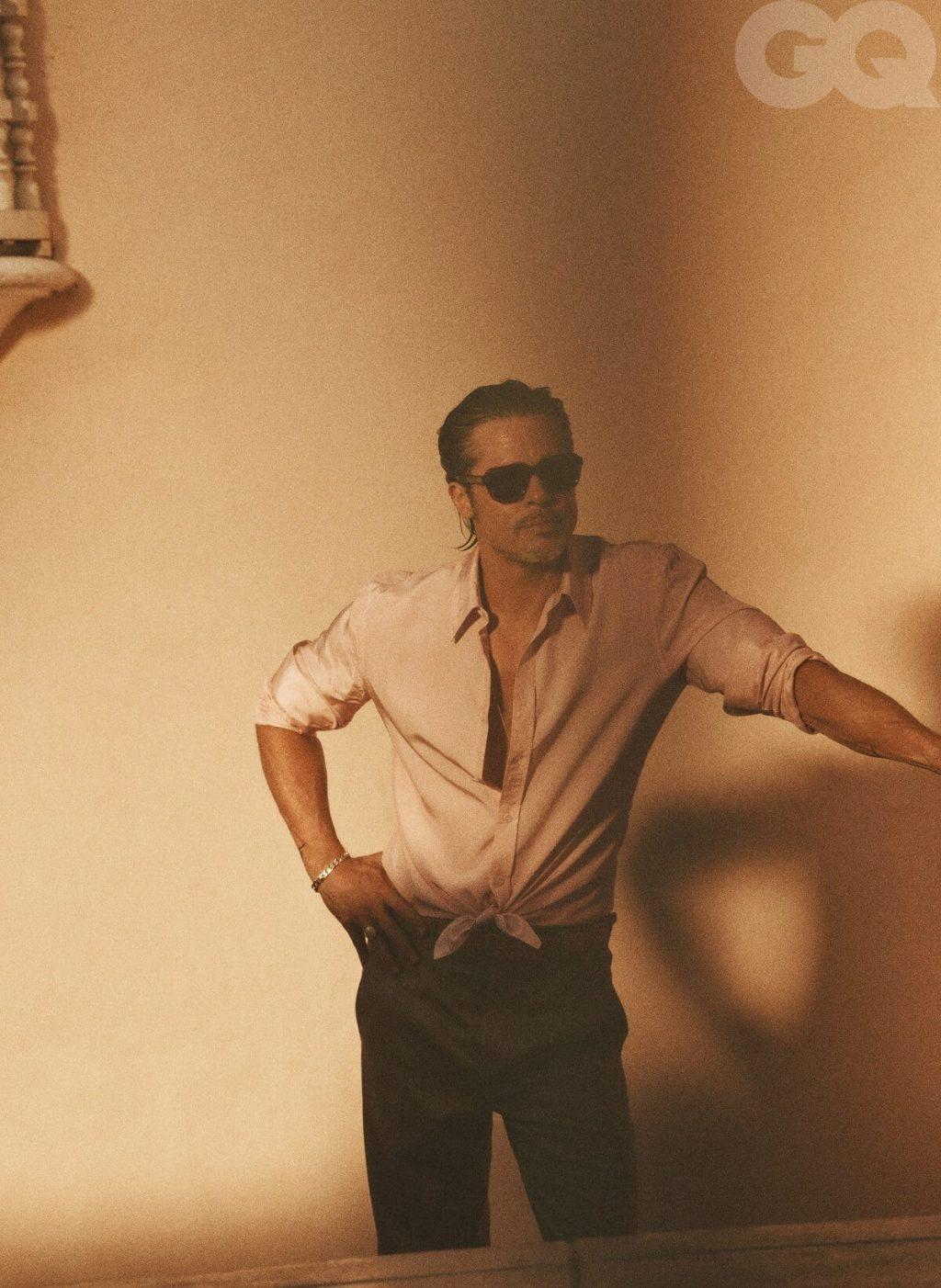At 55, the consummate Hollywood star seems to have the Hollywood parts figured out, using his wattage to get unlikely movies—like his new space drama, Ad Astra—into theaters.
Brad Pitt interviews tend to happen in strange and impromptu places. Like this poolhouse, on a property that belongs to neither of us, not too far outside Pasadena. By necessity and inclination, Pitt likes to present a moving target, and so he spends a lot of time passing through spaces that are convenient to something else he’s doing.
Just yesterday the Quentin Tarantino film Once Upon a Time…in Hollywood, which Pitt stars in opposite Leonardo DiCaprio, opened in New York and Los Angeles. Pitt was also watching the final cuts of Ad Astra, that was due in theaters in September. All of a sudden, people were remembering the existence of Brad Pitt—the great movie star, reminding everyone just how good he is at this when he bothers to do it. Because he doesn’t actually act much anymore. He hasn’t made a big deal about this—just gradually receded into his own life and pursuits, which in the past few years have been turbulent and included a spectacularly public divorce. In Hollywood he’s increasingly become more of a producer and power broker, through his company Plan B Entertainment, than an onscreen presence.
When Pitt does act now, it’s often to help will a film into existence—appearing just often enough in 12 Years a Slave, so that he can be cut into the trailer and waved in front of the movie’s financiers.
So he was getting used to being out and in public—or, at least, semipublic—again. He tried to explain what it was like for him to try to move around outside of his home in Los Angeles. Whole cities sometimes feel practically off-limits to him. New York, for example: “It’s always been tough for me. Just the paparazzi. I can’t have freedom there. So without that—it takes the fun out of it.”
Pitt made Ad Astra with an old friend of his, the director James Gray, and both men will tell you that—though the movie takes the form of an action film, complete with moon-set buggy chases and space-capsule shoot-outs—it’s really about the ideas and thoughts and fears that seize you as you roll into late middle age. Are we alone in this world? Can we ever be truly understood—or, for that matter, ever understand ourselves? “Almost all of it is trying to figure out a way to express our emotional interior,” Gray told me. “And almost none of it: ‘I gotta get the gun.’ It’s about trying to find a way to express something about loneliness. To get at something that we both understood and sometimes couldn’t even verbalize.”
Pitt [tried to sit in] a wooden chair, and then he started leaning back in the chair, and then the chair started squeaking and almost gave way.
“I’m going down,” Pitt said, trying to regain his balance. I offered to switch.
Here he smiled the wolfish, rueful grin that he has been smiling in movies for more than 30 years now. “Yes, you go down.”

Perhaps because of how infrequently Pitt stars in a movie these days, it’s tempting to try to figure out what in Once Upon a Time… or Ad Astra drew him off the sidelines and back to acting. Pitt will acknowledge that these choices have become increasingly personal as his career has gone on. “It’s been my question the last 15 years: ‘If I’m gonna do the role, what can I bring to it that someone else can’t?'”
“It’s about bringing my personal experience, my personal humor, my personal, um, embarrassments, and my personal pains. When I watch [Christian] Bale or [Tom] Hardy, I can’t do what they do. I love watching them. And I couldn’t step into that role.” But, “I want to do the same thing on my end.”
Mostly, he said, he just says no to stuff. “Leo and I were having this conversation the other day. I hit this point in the late ’90s or early 2000s, where I realized I was chasing these interesting [roles], yet I was failing to live as interesting a life as I thought I could.”
He didn’t say exactly when, or what movie, marked this transition, but you can ballpark it. It’s when he goes from the Pitt who was a ’90s cinema icon to the Pitt we know now, the one who is completely without hang-ups about being looked at, who is confident enough in his absurd beauty and charisma to do weird and character-actor-ish things with it. Making quiet, meta-textual statements about celebrity and manhood (The Assassination of Jesse James by the Coward Robert Ford).
He paused, still thinking about why it was that he changed his attitude toward the work he was doing. “Maybe it’s just getting older too, man.”
Another pause.
“It’s just getting f**ing older!” he continued. “How you become more aware of time, and you’ve had more experience, good and bad, with people. And your own wins and losses—the older you get, they don’t seem like so much of a win or so much of a loss. Who you spend your time with, how you spend time—it has just become much more important to me.”
He sculpts now. Listens to a lot of music. Does dad stuff. And he seems to watch a lot of movies, according to people who know him. Jeremy Kleiner, who is copresident, along with Dede Gardner, of Plan B, told me about a conversation he and Pitt recently had about the great Chilean director Pablo Larraín, who is probably best known for his one English-language film, Jackie. But Pitt brought up a different movie, Kleiner said. “He says: ‘The Club. The Club is amazing. That scene where the guy is, like, yelling outside the house, you know?’”
He said he still enjoyed acting, but he didn’t want to center his life around it anymore. He was done living through the movies. “There was just too much emphasis on finding interesting characters. I went, ‘F** me, man. Live an interesting life and the rest will take care of itself.’ Like, ‘You go out and you…live an interesting life. Get out and have real experiences.’ And that is what informs the work. Not going to find the interesting work and then trying to make it up. I just became more conscious of how I was living versus what I was living for.”
In Once Upon a Time…in Hollywood, Pitt plays a fading stuntman named Cliff Booth, doubling for a fading actor named Rick Dalton, played by DiCaprio. Cliff is the kind of character that Pitt plays better than any other living actor: charismatic, a little dangerous, stocked with a deep supply of grace note jokes that Pitt delivers with obvious glee. It’s obvious what Tarantino sees in Pitt. He sees a movie star, a guy who can hold a shot, or a throwaway line of dialogue, and make it feel sexy and immortal—instant film history.

“You know, there’s films we make for the populace. And I love those. If I have one film at the end of the day that I can watch, it’s gonna be a Will Ferrell. That’s where I want to go. But if I like the film, if I like the scene, if I feel something good about the scene, something truthful—I don’t mean ‘like’; I can dislike, but if I know it’s quality—if I feel that way about the film at the end, I know someone else will. I can’t guarantee you it’ll be a mass audience or it’ll be a small audience, but I know. And I’ve always kind of operated that way. Meaning I know when it’s a bit smelly. You know? When it’s all said and done and it smells, I know.”
So you’re not worried about the person who’s like, “I want to see the guy from Ocean’s Eleven.”
“No. Never. When I started out, I once heard a famous actor say that. It was something in the script, and the actor said, ‘My audience wouldn’t let me do that.’ I thought, ‘This guy’s done.’ And where’s the fun in that? I would be bored to tears.”
Pitt used to use all the tools that they teach actors. He would make animal noises, do tongue exercises. He had to teach himself how to become a good actor. But now, “I go by feeling. It’s more music. I really approach a lot of this like my love for music. I can feel the rhythm. I just trust in it.”
He didn’t really recognize the actors who talked about being consumed or haunted by the roles they played, “like James Dean, he couldn’t let go of his character for three months after—I’m not that person. I don’t understand that.” Pitt leaves his characters behind the moment he finishes playing them. “I’m off. Gone.”
Do you feel like you’re more pleased with your performances now than you used to be?
“That’s hard for me to judge. I know my feeling. There’s a lot of other things tied to it. Like, where was I in my life at that week? What happened that day? And some I don’t even remember. So I couldn’t judge it that way. But I can judge it by feeling. Like, if I got lost in it—when the car just slips into gear and you’re cruising.”
“When you walk away from the scene, it’s great. Scenes are like rounds in a fight. You do all your preparation and you get ready, you get your gloves on, you walk to the ring, and it’s literally a walk. They’ll say, ‘They’re ready for you on set.’ And you walk to the ring and then the bell rings and you get those three minutes, and whatever happens, whatever punches you take, whatever you throw back, defines the scene. And it doesn’t always go the way you hope, but if you get to a place of truth, then you’ve won.”
“By the way, while we’re on it, something that always bugs me is when they say, ‘Well, he’s an actor,’ or ‘She’s an actor, actress, actor.’ Meaning the connotation is that you go and fake something. And acting is the exact opposite. I just want to get that on the record.”
What he means is: When you see Brad Pitt acting, that’s Brad Pitt finding his way into a real feeling. He sometimes thinks that everyone, to some extent, is performing—“you know, in our constructs of our personality that we present to others.” But all that ceases when he goes to work. What happens there is entirely real. “I can’t speak for anyone else,” he said. “But that’s what works for me, the kid from the Ozarks. I never studied at Juilliard. I don’t know.”
He’s learned to be genuine and sincere while guarding huge swaths of his life from public consumption.

Dede Gardner told me it is opaque, even to her, why Pitt chooses the films he does. “I think it was this movie, at this time in his life, being about what it is about.”
Ad Astra went into production in 2017, almost a year after Pitt’s wife, Angelina Jolie, filed for divorce.
In thinking about Ad Astra, Pitt said, he and Gray “talked early on about this premise of the inability to connect, which was the springboard for the piece. And then these other ideas started emerging around that. Then: What is connection?”
“Oh, man, I’ve gone through everything. Like, I cling to religion. I grew up with Christianity. Always questioned it, but it worked at times. And then when I got on my own, I completely left it and I called myself agnostic. Tried a few spiritual things but didn’t feel right. Then I called myself an atheist for a while, just kind of being rebellious. I wasn’t really. But I kinda labeled myself that for a while. It felt punk rock enough. And then I found myself coming back around to just belief in—I hate to use the word spirituality, but just a belief in that we’re all connected.”
In your own life, when you want to distract yourself from yourself, what are the alleys you use—is it acting, or…?
“No, I always—I’m aware when I’m doing something in an obsessive way. Like, my friend right now, he’s just obsessed with watches, and he looks them up and studies them. And I know he’s avoiding something in his…in his domain.”
You’re saying when you do it, you know.
“Oh, yeah. I’m very aware. I could feel that from an early age. I knew I was avoiding something. But then once you’re aware of it, then what? I mean, the people I’m really drawn to, they just have no filter. They have no protection. They sometimes get in trouble because of that, but I adore them. I adore that they’re just so open and raw about their feelings at any moment.”
Is it possible that you feel that way because the way your life has developed, you don’t have the option of being that raw or unfiltered?
“Well, I think we’re drawn to what we are trying to change or improve in ourselves. I grew up in the Ozarks, and I’ve come to learn that we’re pioneer stock. We’re people who get things done. Don’t talk about much; get it done. And we don’t complain. Complaining is really looked down upon. And it’s not true. We’re always kind of ‘Woe is me.’ But this idea of if you get hurt, you break an arm, you cut yourself, you just deal with it. You don’t make a big fuss about it. And there’s a positive side to that that I appreciate. But it works the same way internally—what I’ve described as not taking inventory of yourself. How are you feeling at this moment? What’s really going on? We just don’t deal with it, and get on with it. And that, I’ve found a real hindrance.”
The other big idea in Ad Astra, a film that takes the form of a son chasing after his father, is about the nature of fatherhood and legacy. “James and I had been talking a lot about fatherhood, about manhood, the way we were raised, the way our fathers were raised, versus what we want to be for our kids. You know, my dad always talked about—it was very important to him that he build a better path for us than was built for him. And he did it. So where do we go from here as men today?”
“Growing up, it was more about: You don’t show weakness, tears are for girls. And with that comes a loss of vulnerability, even a loss of taking inventory of how you feel. All that is shuttered down. And the movie was designed for him to face a catalyst, where that old regime [of masculinity] doesn’t work anymore. And it’s gonna force him to crack himself open and become more complete. As a man. And I see that with us today.”
There was a version of Brad Pitt that once existed that was the strong, silent type. That Fight Club performance was ironic. But it had an alpha quality to it that was all Pitt—strong and good-looking and completely without mercy. Blind to whatever flaws he might have. And, to some extent, he grew up that way. He had to learn to be a different kind of man, he said. “There’s strength in vulnerability. It’s not a posing, strength of muscles, ‘I can do anything’ kind of blind confidence, but it’s a real confidence in really knowing yourself, your strengths, your weaknesses. And being really…vulnerable to and open with the people you encounter, the people you love. Being able to laugh at your foibles.”
Pitt doesn’t make a big deal out of it, but he’s put a lot behind Ad Astra. His company is producing it; he is practically, the only actor in it. I asked how he will ultimately gauge its success.
“Well,” he said, “for the financiers that will be monetary. And most of our films, which I feel is a mistake, get defined by the opening weekend. They’ll say it’s a hit or it’s a miss. But all of my favorite films, I found them well after the fact.”
He paused a moment. “I guess that doesn’t answer my fiduciary responsibility. But it does! Actually I disagree with that. Because I’m looking at the film: Does it have anything to say in 10 years or 20 years? Could it still have legs? Could it still be around? History is rife with films that we love today that were abysmal ‘bombs’ on their opening weekend. And we find them later, or we catch up with them.”
In 2007, Plan B put out The Assassination of Jesse James by the Coward Robert Ford and A Mighty Heart. “Neither of which, by the way, many people saw,” Dede Gardner said. “And I’ve been trained, as I think most people in Hollywood are trained, to think that it was a failed year of releases, because not many people saw those films. And Brad said to us at the end of that year, ‘I could not be prouder. And you watch: These movies are going to stand the test of time.’ And I just sort of took this huge breath like, ‘Oh, maybe we get to do this in a different way than it is normally done.’ And it was totally thrilling and scary and also cool, you know?”

Plan B, Pitt said, came out of this idea—that as studio-tentpole-type films started taking over Hollywood, people just weren’t making movies that might have a chance to be discovered by film lovers like Brad Pitt, later, down the line. “There was this whole gap between $10 million and $70 million where films suddenly were having a really difficult time getting made,” Pitt said. “And really difficult, talented voices, great storytellers that we had loved—we started supporting those. It wasn’t any design to be a successful production company. I had started developing my own stuff, so I might as well do those in-house. But that wasn’t the primary focus.”
Hollywood is a place where people hold tightly—maniacally—to whatever clout they have. But Pitt began lending his out to guys who really needed it. “And I was in a very fortunate position at that time,” Pitt said, “where I had that kind of power, where I could.”
Gardner told me that Pitt’s involvement in Plan B varies by the film. “It varies relative to real life taking place. But I think the most important thing is that the culture and spirit of the company are very much born of him—of his mind-heart.”
Streaming and the further collapse of the studio system have muddied the water a bit in terms of the role Plan B and Pitt now play in the industry, Pitt said, for better—in terms of who was getting opportunities—and for worse too. “I wonder about the future of film. I really do. There’s so much content out there, so much disposable content, that a lot can get lost.”
He said these days he felt like he was watching the movies he loved just vanish from the consciousness. “I love a slow, contemplative film. So I look at youth today, and they absorb so much information and seem to like it more in quick bursts and don’t have necessarily the palate to sit two hours for a film. They would rather watch a series for a quick bit, and then they can follow another one if they want to or move on to something else. I’m no longer shocked now when I ask a 20-year-old, ‘Have you seen The Godfather?’ And they say no. And I wonder if they ever will. So that’s where I go, ‘Ooh, is there a future to film? What will survive?’ ”
For years now Pitt has had a go-to analogy when people ask him about fame. (People do this all the time.) He describes it “as being that lone gazelle out on the plain. And the tigers, you know, they’re in there. They’re in the grass. And you’ve lost the herd. You’re not connected to the herd anymore. And it’s that. It is that loss of privacy. And being hunted.”
I’ve always loved this analogy. The honesty of it, the way that it—in its blunt mix of loneliness and fear and the feeling of being perpetually observed—captures what must be something close to the truth, without being particularly self-pitying or angry. He’s lost the herd. It is what it is.
“Until you see that other gazelle.” DiCaprio, maybe. He doesn’t say exactly.
But how many gazelles are there in this world, really? Like, five?
“Yeah. No, it’s odd.”
“But it has its perks too.”